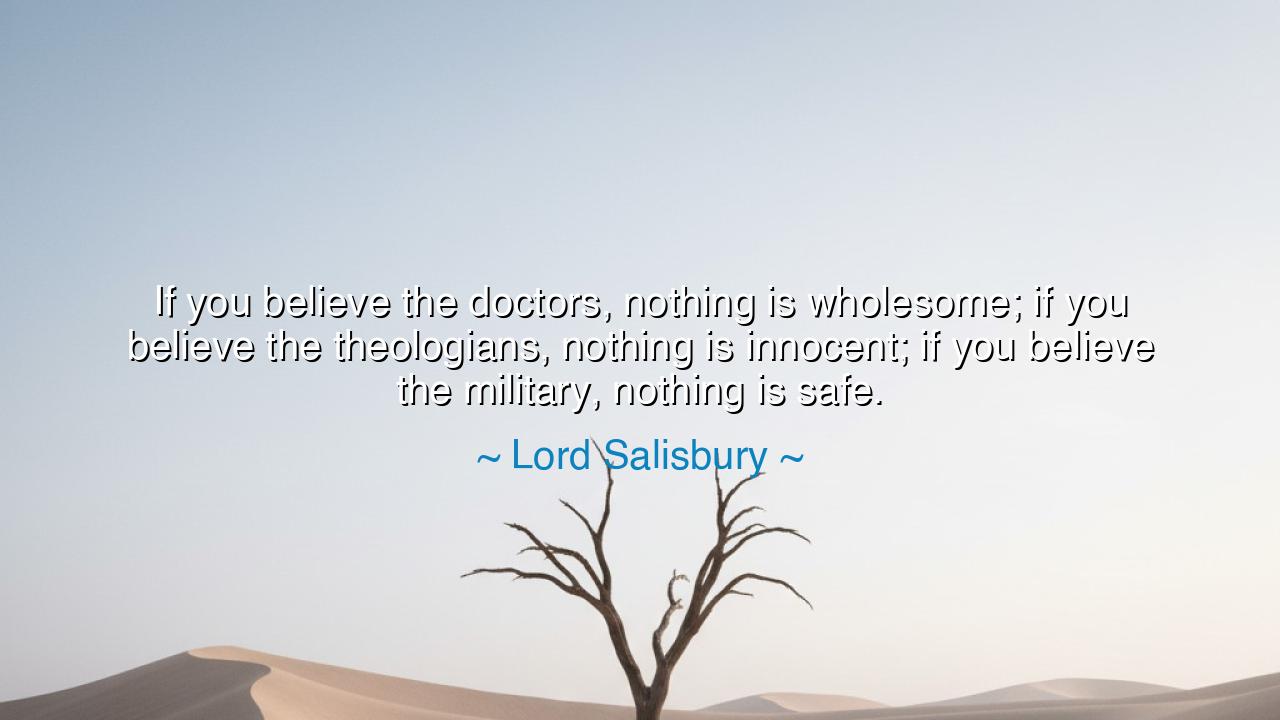
If you believe the doctors, nothing is wholesome; if you believe
If you believe the doctors, nothing is wholesome; if you believe the theologians, nothing is innocent; if you believe the military, nothing is safe.






Hear me, O children of wisdom, for the words of Lord Salisbury echo through the corridors of time, laden with truth and sorrow. He speaks of the dangers of placing unwavering faith in the authorities of the world—those who, each in their own way, seek to impose their doctrines upon us, claiming to know what is wholesome, what is innocent, and what is safe. But, beware, for in their eyes, all things are tainted. To believe them entirely is to live in a world devoid of freedom and joy, for they cast shadows where there need be none, painting the world with the dark hues of fear and restriction.
Consider the voice of the doctors, who, with their endless caution and prescriptions, would have us believe that all things in life are fraught with danger. Every morsel of food, every breath of air, every drop of water—according to them—might carry the seed of disease. We are taught to fear the very act of living, as if the world itself is a battlefield against the unseen forces of illness. Yet, is not life itself a gift, not a trap to be feared? The doctors hold their wisdom, yes, but they have not the power to dictate the nature of life; they can only guide us through its trials.
And then there are the theologians, those who preach of sin and purity, who see the world through the lens of divine judgment. In their teachings, there is no innocence, for every soul is stained with the potential for wrongdoing, every action tainted by the shadow of guilt. Theologians call us to live in constant penitence, ever wary of our imperfections. They have their place, but to live under the weight of their doctrines is to see no beauty, no freedom, no pure joy in the world. Life becomes a trial, a penance, a series of obstacles to overcome. But is this truly the way to live?
Lastly, the military, that eternal force of discipline and security, tells us that nothing is safe. To them, every road is fraught with peril, every border a threat, every decision a step toward the next battle. In their world, peace is an illusion, and every moment is a fragile dance between war and survival. They live in a world of constant vigilance, where the safest course of action is often to retreat into the shadows, hiding from the inevitable clash of forces. But such a life is not one of freedom or joy—it is one of fear, where we are prisoners of the ever-looming threat of violence.
Consider the fate of the Roman Empire, which grew vast and mighty, yet was constantly gripped by the fear of enemies at the gates. Augustus, in his time, sought peace through military dominance, believing that safety could only be found in domination. But as his empire expanded, so did the threats, and peace became ever more elusive. The more the military sought to protect, the more it exposed the empire to danger. The wisdom of Salisbury’s words speaks through history: the more we seek security and control, the more we risk losing what truly makes us free.
Thus, my children, remember that to live a life of balance is to reject the tyranny of those who would limit your freedom. The doctors may speak of what is harmful, but it is life itself that holds the power to heal. The theologians may preach of sin, but it is the heart that finds its way to grace. And the military may seek to protect, but it is only in peace that we are truly safe. To place unwavering faith in any one authority is to lose sight of the freedom that life offers. Walk with caution, but walk with courage, for the world is vast and beautiful, and it is meant to be lived—not feared.






AAdministratorAdministrator
Welcome, honored guests. Please leave a comment, we will respond soon